Posts Tagged ‘minoxidil’
Wednesday, September 5th, 2012
 Medical Treatment for Increase Hair Loss from Androgenic Alopecia Medical Treatment for Increase Hair Loss from Androgenic Alopecia
Online sources assert that topical Spironolactone (Aldactone) can be used to reduce hair loss; as well as, Nizoral shampoo. There is not strong medical evidence supporting Spironolactone effect on reducing hair loss. Orignally developed for hypertension some level of anti-androgenic effects have been noted. Systematic use has shown effective in female hair loss depending on the type. Use in men manifested side effects of sexual dysfunction and is not recommended for treatment of androgenic alopecia in men.
Nizoral (ketoconazole 5%) is an anti dandruff medication with antifungal properties. There are some indicators that it can affect hair loss in male patterned baldness. Presently it does not have FDA approval nor does Sprionolactone.
The only FDA approved medications for hair loss treatment are Minoxidil and finasteride. Nizoral is not one of the FDA approved medications for hair loss treatment. A daily regimen of finasteride with Minoxidil is effective for many men. Minoxidil is recommended to be used twice a day, some find positive results with just a once a day application. Minoxidil does not double up the effect of finasteride but can add to it as an adjunct treatment.
Tags: Finansteride, hair loss, hair loss treatment, men hair loss, minoxidil, Parsa Mohebi, parsa mohebi md
Posted in hair loss products, Los Angeles Hair Transplant, men hair restoration | No Comments »
Tuesday, February 21st, 2012
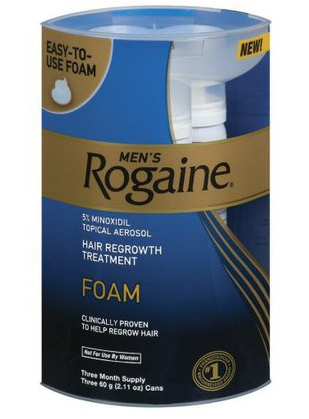 We receive a lot of questions at US Hair Restoration about the use of Minoxidil (Rogaine), and how it affects hair growth after a hair transplant procedure. There are mixed reviews people find on the internet through different websites and blogs about the Foam version of Rogaine. Some say it helps hair growth, others say it hinders, while some claim it does absolutely nothing. We receive a lot of questions at US Hair Restoration about the use of Minoxidil (Rogaine), and how it affects hair growth after a hair transplant procedure. There are mixed reviews people find on the internet through different websites and blogs about the Foam version of Rogaine. Some say it helps hair growth, others say it hinders, while some claim it does absolutely nothing.
Minoxidil (Rogaine) may be used after a hair transplantation on the newly transplanted area, for protecting the already existing hairs which are genetically predisposed to thinning. The hair grafts which are actually transplanted from the donor area require no medication for growth and maintain a permanent residence in the balding area. Those are the healthy hairs which are not affected by the hormone DHT (Dehydrotestosterone) which causes thinning and baldness.
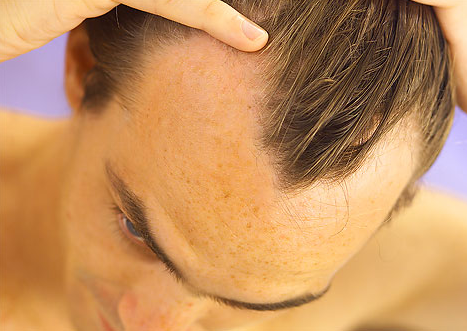 There may be some loss of existing native hair in the balding area due to shock loss, and for this we recommend Propecia for male patients to protect against. Propecia is proven to work better then Rogaine for the prevention of shock loss in men, and continues to have remarkable results in the patients who use the medication as directed. Unfortunately it does not work on women, but in these cases Rogaine does work and is a recommend option for the first few months after hair restoration surgery. There may be some loss of existing native hair in the balding area due to shock loss, and for this we recommend Propecia for male patients to protect against. Propecia is proven to work better then Rogaine for the prevention of shock loss in men, and continues to have remarkable results in the patients who use the medication as directed. Unfortunately it does not work on women, but in these cases Rogaine does work and is a recommend option for the first few months after hair restoration surgery.
Tags: female hair loss, finasteride, Male Hair Loss, minoxidil, propecia, rogaine, shock loss
Posted in after hair transplant, hair loss complications, hair loss medication, men hair restoration, women hair loss | No Comments »
Sunday, July 10th, 2011
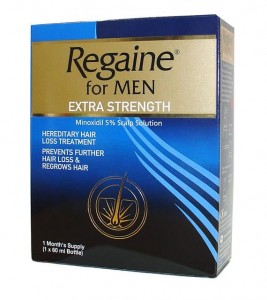 There are two proven medical treatments for hair loss , aside from hair transplantation surgery, Minoxidil (Rogaine) and Finasteride (Propecia). The hair growth action mechanisms for Minoxidil are not completely understood, three main suggested mechanisms are: There are two proven medical treatments for hair loss , aside from hair transplantation surgery, Minoxidil (Rogaine) and Finasteride (Propecia). The hair growth action mechanisms for Minoxidil are not completely understood, three main suggested mechanisms are:
1. Blood Vessels in the scalp which are impacted by Nitric oxide chemical agonists
2. Hyperpolarization of the cell membrane of follicles caused by potassium channel openers
3. The effect of nitric oxide conceivably due to Vasodilation
A recent study was conducted by Korea’s Kyungpook National University’s Department of Immunology which was published in The Journal of Dermatological Science. It revealed a new Mechanism of Minoxidil which activates the Beta-Catenin pathway in derma papilla cells, which is one of the two different cells which aids in the growth and development of hair. It was announced by those performing the research that this particular mechanism may possibly be the reason for the anagen prolongation effect.
The duration of growth in the anagen phase (time of continual growth) is what develops hair length. The researchers underscored the fact maintenance of the activity of Beta-Catenin for the dermal papilla cells (DPCs) aids hair follicles to actively grow. Minoxidil (Rogain) gives growth remedy for male pattern baldness which suggests it can enhance the growth phase in the life cycle of hair.
A mouse model was used for the study using 3% minoxidil for a ten day duration. Beta-Catenin responsive TCF reporter plasmid was used to transfect DPC’s. The results revealed the anagen phase was extended significantly after the use of minoxidil. The researchers came to the conclusion minoxidil prolongs the activating Beta-Catenin anagen phase in DPC’s and has the potential to be a primary pathway for hair growth or the prevention mechanism for hair loss.
A study like this helps to enhance our comprehension of hair loss and growth. Over time this can help the field of hair restoration providing more options to confront hair loss with greater sufficiency.
Tags: anagen, Dermal Papilla, DPC, growth phase, minoxidil, minoxidil mechanism, nitric oxide, vasodilation, β-catenin
Posted in hair loss medication, hair loss products, men hair restoration | No Comments »
Tuesday, January 19th, 2010
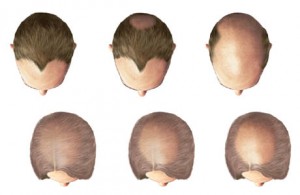
Q:
Hey Dr. Parsa Mohebi,
I’m grateful you took time out to see me on Saturday. The letter that gave a summary of what we talked about was very thorough and I just wanted to say thanks for that.
Since the last time we met, I did some of my own research and came up with a few queries:
1) When it comes to giving a name to my hair loss pattern, is Alopecia the correct way to describe it?
2) Would a Cortizone shot be an option for me?
3) Is laser therapy OK?
4) If I happen to use minoxidil, I’m wondering if it has to be 2% or would a higher percentage result in more hair growth and faster hair growth?
5) I was told to receive a complete medical evaluation, do you know of a doctor I can go to? I want someone I can trust.
Thanks again for taking the time to see me and also to accommodate my questions.
Sincerely,
Stephen
-
A:
Hello Stephen,
I’ve provided answers to your questions in chronological order.
1) When it comes to giving a name to my hair loss pattern, is Alopecia the correct way to describe it?
Alopecia, literally, would be defined as hair loss. There are many different types of alopecia or hair loss, such as male patterned alopecia or female patterned alopecia or alopecia cicatricial. I believe the pattern on your head is a male pattern since hair was lost in the frontal area as you kept hair on the donor area intact. This is the reason you may be a potential candidate for a hair transplant since your medical evaluation stated that you’re not medically treatable for hair loss.
2) Would a Cortizon shot be an option for me?
Absolutely not. But steroid shots are sometimes used for Alopecia Areata (AA), which is an autoimmune disorder. Alopecia Areata is a hair loss condition with patchy hair loss spots. Your condition is not Alopecia Areata.
3) Would you consider laser therapy?
I do not recommend laser therapy for hair loss in the form of laser comb or laser machines because of the lack of solid medical evidence that support their effectiveness at this time.
4) If I were to use Monoxidil, does it have to be 2% or a higher percentage would yield more and faster hair growth?
You can start with 2% and then you need to be re-evaluated in six to 12 months and a treatment plan might need to be adjusted at that time.
5) you recommended a complete medical evaluation, could you please recommend someone that you trust?
Any good internist or endocrinologist could follow through with the lab works that you need. Our letter includes the list of medical conditions that should be considered and lab works to rule out those women like you who have hair loss. You can share my letter with any good internist or endocrinologist and he or she should be able to follow through with your lab result and treat any treatable conditions that could possibly be found.
Have a great day,
Tags: alopecia areata, hair loss, hair loss pattern, hair loss treatment, laser therapy, laser therapy for hair loss, minoxidil
Posted in Bakersfield hair transplant, California hair transplant, hair loss medication, hair loss products, hair transplant, men hair restoration, Newport Beach hair transplant, Orange County hair transplant | No Comments »
Monday, November 16th, 2009
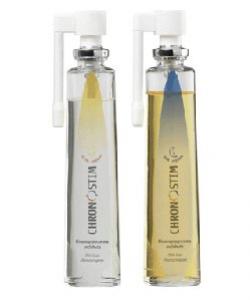
Q:
Hey Doc:
My hair is as thin as the state of economy; I’m trying to figure out how to make it stronger. Two products I tried are, Chronostin, suggested by my barber; the other one was recommended to me by my psychiatrist: it’s called Minoxidil, Estradiol Vateral, Esopropyl Acohol.
I’d like to hear your expert advice on these products, doc?
Yours truly,
A:
I commend you for seeing a skin doctor. As part of your dermatologist’s diagnosis, I’m quite certain he took a look at you to see if there was miniaturization of hair leading to hair loss in men. Let me add that combining minoxidil with other hormonal medications hasn’t been proven to be a solution to hair loss. You were probably diagnosed with male pattern baldness and then the doctor decided to recommend it. Since that’s what happened, you might also want to try finasteride, a medication much more powerful compared to Minoxidil, based on a few research publications.
The other product, Chronostim, I don’t know what that is. But, being the dedicated doctor I am, I did some of my own research on it. Chronostim is a product that says it is able to act on a group of factors playing a part in hair loss. It has both morning and nighttime treatments.
It contains sabal enriched lauric acid (seborrhea regulating ), tocopherol Nicotinate (microcirculation stimulating, oxygenating bulbar), glycyrrhetinic Acide bta (reinforces the activity of 5-alpha ductase), excipient alcohol-silicone, perfumed- hypoallergenic.
Chronostim, called NIGHT, contains a semblance of Ruscus, enriched in Neoruscine (stimulating of the VEGF), Diguanosine traphosphate (GP4G – cellular stimulant), Piroctonolamine (cleansing, anti-irritant), excipient hydro-alcoholic, perfumed-hypoallergenic.
Clear as the Los Angeles smog, right? To give it to you straight, these products haven’t been proven in any way whatsoever to aid in the treatment of men’s hair loss.
May I be so bold to say, if I were in your shoes, I’d continue taking finasteride (Propecia), if your dermatologist is okay with it. However, if you continue to experience hair loss, a hair transplant would be the best answer.
Best,
Dr. Mohebi
Tags: chronostim, Chronostin, dermatologist, estradiol vateral, finasteride, hair loss product, male pattern hair loss, minoxidil, Propeica, skin doctor
Posted in hair loss medication, hair loss products, hair transplant, men hair restoration | No Comments »
Tuesday, November 10th, 2009
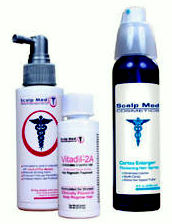 Q: Q:
Dear Parsa Mohebi,
I hope you’re doing great. I hope you also remember me – it’s —-. I visited your office in January in Mission Viejo, California. I am currently in Dubai! Thank you for the letter which you sent me regarding the tests I should take. I appreciate the time you took out for me. I have taken the tests and wait for the results.
I wanted to ask you a question regarding the hair growth. Recently I was going through some websites and landed on a product called ScalpMed. I was quite alarmed at how this product worked (as it says it does). I am aware that there are numerous type of products available in the market but for some reason this really got me interested. Can you please have a look at it and advice me whether or not to take it seriously?
I appreciate for your time. Looking forward to hear from you!
A:
The hair loss treatment industry is a multi-million dollar business. As such, there are usually companies offering much cheaper, short-cut type products which claim to have the same benefits as more mainstream hair restoration methods.
“I’ve tried hair loss products, but it didn’t work. I don’t think I’ll try it again.”
Most likely, that’s not a line you’ll hear in a commercial for a hair loss product on late night television. But that’s what I think of most of these infomerical-type hair loss treatment goods.
Given the high demand, hair loss products are numerous, but not always effective.
If patients ask me about hair loss products, I like to post them on this blog, as I’m sure there are a lot of people interested in reading about it. Scalp Med is a company which makes numerous products on hair thickening and hair loss treatment. Scalp Med likes to assemble different types of kits for their prospective customers, including a Detoxifying Cleanser Kit, Scalp Med for Women, and Mega-Multi Vitamins.
Like other companies in the hair loss industry, Scalp Med’s advertisements go as far as to say that they are FDA-approved. Any Joe Schmo can find photographs, legit testimonies, and other types of “proof” from balding clients who try to promote Scalp Med’s product.
There are various types of Scalp Med product, including topical Vitadil-5A for men, Vitadil-2A for women, topical NutriSol-RM, and Cortex Enlarger hair thickening spray. The first two Vitadils are topical solutions which contain minoxidil (also Rogaine’s key component). The claim Scalp Med makes is that they have formulated a unique delivery agent which is supposed to increase the absorption of minoxidil in women and men.
For the Scalp Med products NutriSol-RM and Cortex Enlarger thickening spray, we are sort of left in the dark about what exactly is contained in them. Except for minoxidil, the other ingredients contained in these products haven’t been proven to aid in the growth of hair and the health of hair. It’s important to note, the cleansing agents contained in a lot of these types of products do nothing to help a person grow their hair. No matter how clean hair is, it doesn’t help it to grow. Don’t believe the advertising.
I strongly urge you to find out whether your hair loss is treatable. It may stem from some other health condition instead of it being hereditary. If you’re a woman, and you know you have a typical type of female patterned hair baldness, then Rogaine may help.
Sincerely,
Dr. Mohebi
Tags: hair cleanser, hair loss product, hair volumizer, minoxidil, rogaine, Scalp Med, ScalpMed
Posted in California hair transplant, hair loss medication, hair loss products, men hair restoration, women hair loss | No Comments »
Wednesday, January 21st, 2009
 What is the best hair loss product? We are hearing many things about new hair loss products every day. Many contain active ingredients that may help hair, some don’t have anything for hair loss treatment and some may be harmful for your hair. Here is what one of my patients asked me and I answered in the blog about one of the hair loss product. What is the best hair loss product? We are hearing many things about new hair loss products every day. Many contain active ingredients that may help hair, some don’t have anything for hair loss treatment and some may be harmful for your hair. Here is what one of my patients asked me and I answered in the blog about one of the hair loss product.
The patient has been experiencing male pattern baldness for some years now. He used Rogaine, it worked at first but now no longer respond to it. Propecia is tried too, but had to stop it for the side effects. Patient is saving money to be able to get a good quality hair transplant and meanwhile is wondering whether or not hair loss products can help him keep his own hair. In this case he is using Revivogen.
I generally research about all incoming questions by reviewing the websites for the hair product. For similar patients, I really like to know what kinds of side effects you experienced with finasteride (Propecia), because finasteride is an effective hair loss medication, although it has been blamed unfairly for many side effects. I put most my Los Angeles and Orange County Hair Restoration Clinics patients on finasteride when they have significant miniaturization. Finasteride can help prevent further hair loss. Some of your hair loss might be irreversible by medication and you may need hair restoration surgery, but at least you can stop further hair loss by the time that you can restore your hair surgically. Revivogen is a hair loss product with some natural compounds that mainly inhibit 5-Alpha-Reductase. 5-Alpha-Reductase is the enzyme that converts testosterone to dihydroxytestostrone (DHT). Prevention of DHT production can slow down hair loss in male pattern baldness.
Saw Palmetto Extract is a good component of this hair loss product, which is a DHT blocker and is used systemically for prevention of both hair loss and prostate enlargement. The efficacy of its topical product is not studied as extensively in large human experiments. Other components include a variety of fatty acids like: Gamma Linolenic acid (GLA), Alpha Linolenic acid (ALA), Linoleic Acid and Oleic Acid without strong human research on their absorption from skin level as well as their efficacy on human hair growth. Other components such as Azaleic acid, Vitamin B, Zinc, Beta-Sitosterol and Procyanidin Oligomers have shown some effects on the DHT production in labs, but the extensive studies to compare their effect with more researched medical treatments for hair loss is lacking.
One problem is the absorption of the active ingredients, which is not studied extensively. I personally have not heard anything about any serious side effects of Revivogen, but I would rather have more information about long term studies, which are published in peer reviewed medical journals, before I can recommend the product to my patients. There are many hair loss products out there, which are safe, but you do not have a life time to go around and try them all to find out whether they have any effect on your hair or not.
A good hair specialist that you can trust can help you tremendously. Patient believe that since they are not spending much money on hair loss product and hair loss products are more affordable than hair transplant, but they don’t realize that most time they may not get any result from some hair loss products. Your hair loss doctor should be able to document the level of your current hair loss and miniaturization of hair and can come up with a master plan, which includes medication treatment, surgery and even cosmetic alterations that can make your hair look better. Side effects of the medications that you tried before need to be re-evaluated closely by your doctor.
You want to make sure that the side effects of finasteride are for real and don’t take away this powerful, FDA approved hair loss treatment. If you have no alternatives, your doctor may have some suggestions for your individual condition to preserve whatever hair you have with a hair loss product with minimal side effects.
Tags: hair loss product, hair loss treatment, minoxidil, Revivogen, saw palmeto
Posted in hair loss products, men hair restoration, Orange County hair transplant, Uncategorized | No Comments »
|
|
 Medical Treatment for Increase Hair Loss from Androgenic Alopecia
Medical Treatment for Increase Hair Loss from Androgenic Alopecia






